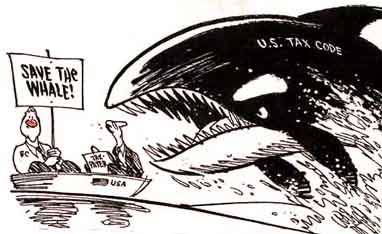|
|
Cal Thomas
 What's fair about our tax system?
What's fair about our tax system?
THE LAST TIME there was a debate about taxes, Democrats wanted to make sure "the rich" paid their "fair share." As usual, Republicans lost the debate because they were unable to counter the presupposition that government, no matter how big, is good, and people who want to keep more of what they earn are greedy and lacking compassion.
The next time there is a debate about taxes (which should
begin now and continue through the 2000 presidential
election), it should focus on what is fair about big government
and its demands for our money. Is it fair that tenacious and
gifted workers, who play by  life's rules, must hand over more
than half their income to grasping government? Is it fair that
middle-income people pay more than one-third of their
earnings to government? Is it fair that government sees itself
as our keeper and protector instead of the defender of
economic and personal freedom?
life's rules, must hand over more
than half their income to grasping government? Is it fair that
middle-income people pay more than one-third of their
earnings to government? Is it fair that government sees itself
as our keeper and protector instead of the defender of
economic and personal freedom?
We need is someone to stand up for the taxpayer and not be afraid of big government's claim of executive privilege over our earnings.
The place to begin is with legislation that requires full disclosure of how much of our money government takes. If we can have truth in labeling and truth in lending, why not truth in taxing?
The fact is that while the economy booms, real wages have been stagnant for 20 years because hidden taxes have absorbed pay. According to the Cato Institute, more than one-fourth of every dollar employers pay for average manufacturing-wage workers goes to government. The government tax bite amounts to $4.10 per hour for such a worker, but only about half of the real deductions are listed on the worker's pay stub.
Cato analyst Dean Stansel offers this example: "Assume that you're an average manufacturing-wage worker who receives a paycheck twice a month. Your gross earnings cost your employer $1,133.33 per pay period, but when the employer's share of the payroll taxes is included, your employer spends $1,289.76. But your take-home pay is only $934.73."
Stansel notes that if the current withholding system didn't exist, you would get the entire $1,289.76 and have to go to seven different windows to pay your tax obligation. You would pay $86.70 for the employer share of Social Security and Medicare; another $86.70 for the employee share of Social Security and Medicare; $56.12 for workers' compensation; $9.28 for state unemployment insurance; $2.33 for federal unemployment insurance; $85.31 in federal income tax; and $26.59 in state income tax.'' That totals $353.03 to the government, only half of which appears on your pay stub. Your pay has shrunk 28 percent.
Out of the remaining take-home pay comes property taxes, sales taxes, gasoline taxes, cigarette taxes, alcohol taxes and more, depending upon where and how you live.
Other hidden costs of government include complying with the impossibly complex 10,000-page tax code ($225 billion in 1996 alone) and complying with government regulations ($688 billion, or about $6,800 per family).
Today, the total federal, state and local tax burden in America is at an all-time high. The budget surplus is projected to hit $50 billion or more this fiscal year, but don't look for the Clinton administration or this timid Congress to give much of it back. According to the Tax Foundation, a median-income, two-earner family pays nearly $23,000, or roughly 38 percent of its income, each year in federal, state and local taxes. That is more than most families pay for food, clothing, housing and transportation combined. The question is not how much government "needs," but how much workers deserve to keep.
The bigger government gets, the more it suppresses freedom,
real growth and opportunity. Big government isn't fair, and it
isn't fair when we are required to turn over so much of our
money to a system that claims to be better and more
"compassionate" at spending it than those who earn it.
The next presidential campaign should feature at least one
candidate who will fight class warfare and envy head-on. That
candidate should put government in its proper place and
pledge to put more of our money back in its proper place:
our pockets. Charity and compassion should begin at home,
not with
4/10/98: CBS: 'Touched by a perv'
4/8/98: Judge Wright's wrong reasoning on sexual harassment
4/2/98: How about helping American cities before African?
3/31/98:Revenge of the children
3/29/98: The Clinton strategy: delay, deceive, deny, and destroy
3/26/98: Moralist Gary Hart
3/23/98: CNN's century of (liberal) women
3/17/98: Dandy Dan
3/15/98: An imposed 'settlement' settles nothing
3/13/98: David Brock's Turnabout